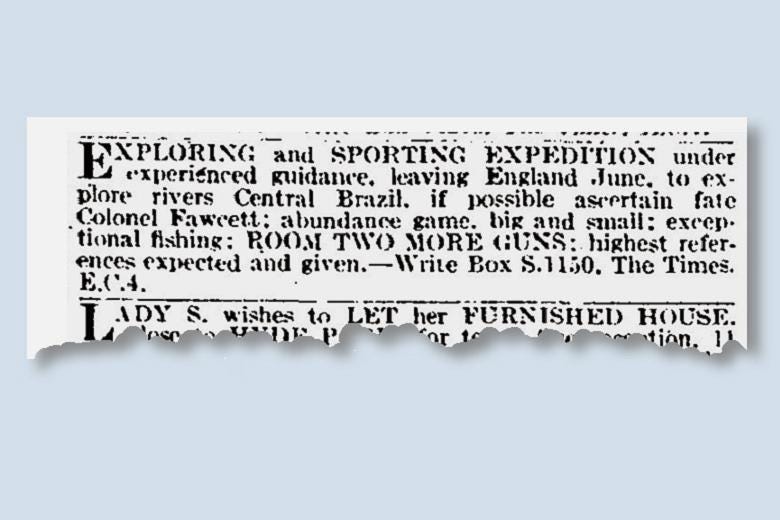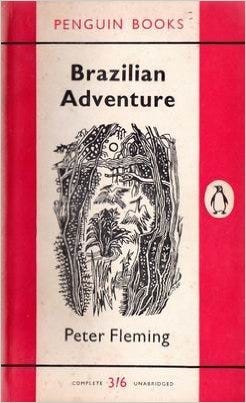The Prudent, The Wise and The Romantic
"Exploring and sporting expedition, under experienced guidance, leaving England June, to explore rivers Central Brazil, if possible ascertain fate Colonel Fawcett; abundance game, big and small; exceptional fishing; ROOM TWO MORE GUNS; highest references expected and given."
- The Times of London advertisement (1932)
At the turn of the 20th century, exploration in the name of 'big science' reached its zenith. This was an era when scientific expeditions carried immense socio-economic implications, transforming intrepid explorers into media sensations. No corner of the earth was to remain uncharted, and names like Livingstone, Thomson, and Marsden dominated newspaper headlines and dinner conversations alike.
It was against this backdrop of explorer-as-celebrity that Colonel Percy Harrison Fawcett, the renowned Amazonian explorer, vanished in 1925 while searching for a lost civilization he called "Z." The Times of London, recognizing both the public's insatiable appetite for an adventure, with a promotional opportunity, organized an expedition to uncover his fate1.
Enter Peter Fleming, whose sardonic take on the whole affair was crystallized in his observation: "...it is unpleasant to be regarded as either a lunatic or a hero when you know perfectly well that you are merely going to take an exceptionally long holiday."
Fleming's career would span multiple lives - adventurer, soldier and travel writer. When he joined the Times expedition, he was serving as literary editor of The Spectator but his true legacy would be crafted through his travel writings. They became some of the most celebrated of the early 20th century and are still in print today. Perhaps his greatest indirect contribution to popular culture was as an inspiration for the archetypal British super-spy, James Bond2.
Through Fleming's keen wit, the Times expedition to the Amazon transforms into a distinctly British comedy of errors. His narrative paints a portrait of mismatched adventurers led by incompetent leadership, woefully unprepared for the challenges ahead. Not unlike business in general and, more specifically, current AI-driven transformation.
While the Amazon rainforest throws everything at Fleming and his partners - political upheaval, punishing weather, prowling alligators, and logistical nightmares - Fleming's sharp observations of human nature shine through with his characteristic dry humour. His comparison of São Paulo to Reading ("only much farther away") exemplifies his talent for describing exotic locations with deadpan British understatement.
Though Fleming and the Times expedition (spoiler alert) failed to definitively determine Fawcett's fate, his account of the journey, Brazilian Adventure, became a bestseller. The title's straightforward simplicity perfectly encapsulates Fleming's approach: treating the extraordinary as merely unusual, and the exotic as simply inconvenient.
In 1933, Peter Fleming chronicled the varied reactions to his planned South American expedition in Brazilian Adventure. His observations of human nature feel startlingly relevant to anyone launching an ambitious venture in 2025.
Fleming noted that people weren't envious of his upcoming expedition – they were amazed. "Most people," he observed, "would do it like a shot, if they had a chance. But they don't have the chance and have wisely given up hoping for the chance." This resignation to the status quo echoes perfectly in today's entrepreneurial landscape, where innovation often faces the subtle resistance of "Why would you do that when you could easily do this?" – with the unspoken polite condemnation of "just like everyone else."
Fleming outlines the advice given by his friends and contacts before his departure to South America:
"There were the Prudent, who said: 'This is an extraordinarily foolish thing to do.'"
"There were the Wise, who said: 'This is an extraordinarily foolish thing to do; but at least you will know better next time.'"
"There were the Very Wise, who said: 'This is a foolish thing to do, but not nearly so foolish as it sounds.'"
"There were the Romantic, who appeared to believe that if everyone did this sort of thing all the time the world's troubles would soon be over."
"There were the Envious, who thanked God they were not coming; and there were the other sort, who said with varying degrees of insincerity that they would give anything to come."
"There were the Correct, who asked me if I knew any of the people at the Embassy."
"There were the Practical, who spoke at length of inoculations and calibres..."
"There were the Apprehensive, who asked me if I had made my will."
"There were the Men Who Had Done A Certain Amount of That Sort of Thing In Their Time, You Know, and these imparted to me elaborate stratagems for getting the better of ants and told me that monkeys made excellent eating, and so for that matter did lizards, and parrots; they all tasted rather like chicken."
The cast of characters Fleming encountered before his departure reads like a modern entrepreneur's journey:
"The Prudent" declare it foolish outright. "The Wise" suggest you'll learn from your inevitable failure. "The Romantic" believe such ventures could solve all the world's problems. The spectrum continues through "The Envious," "The Correct" (obsessed with credentials and connections) and "The Practical" (fixated on technical details). Only "The Very Wise" acknowledge the underlying merit beneath the apparent folly.
Most striking is how easily Fleming's observations transpose to modern ventures. Replace his "inoculations and calibres" with "APIs and LLMs," his expedition-hardened veterans' warnings about ants with cautions about procurement, and you have a perfect mirror of the advice given to any ambitious startup founder today.
At its core, both expedition and technological innovation begin with imagination – a vision of what might be possible. Yet this imagination must navigate through a gauntlet of human attitudes and incentives, each representing different facets of resistance to change. Like Fleming, today's innovators must face their own versions of the Prudent, the Wise, and the Romantic, each offering their particular blend of caution, cynicism, or unrealistic optimism.
Fleming's words, written almost a century ago, are a reminder that human nature remains the constant variable in any ambitious undertaking, whether in 1933 or 2025.
We will be back next week with more links.
Quote
The trouble about journeys nowadays is that they are easy to make but difficult to justify.
Peter Fleming, Travels in Tartary
Fawcett's remarkable life and mysterious disappearance would later be chronicled in David Grann's Lost City of Z.
Famously created by Peter’s younger brother, Ian.



